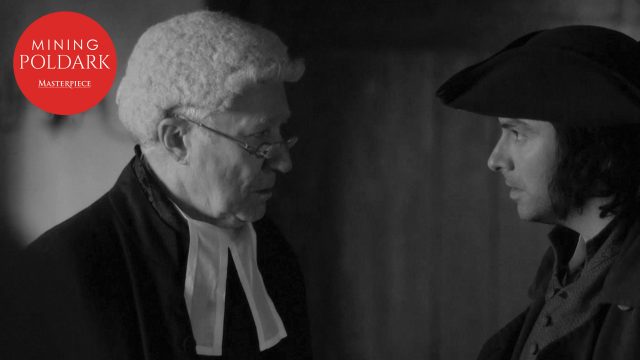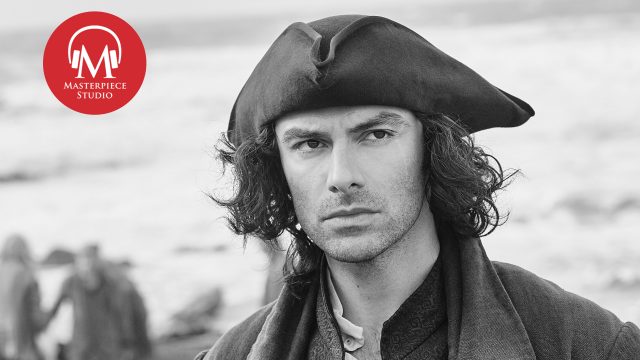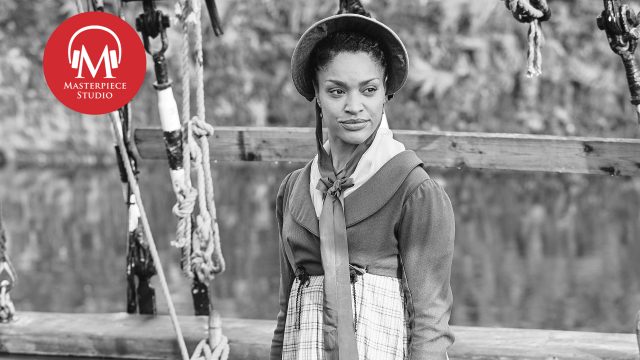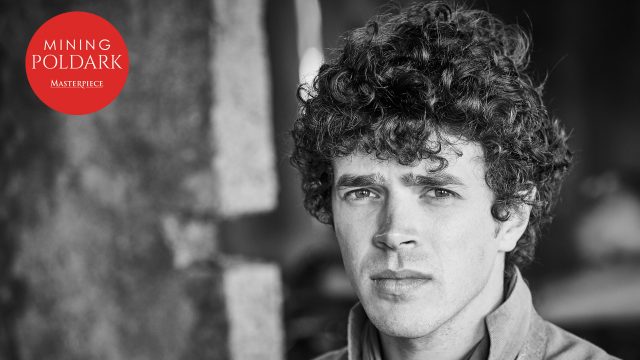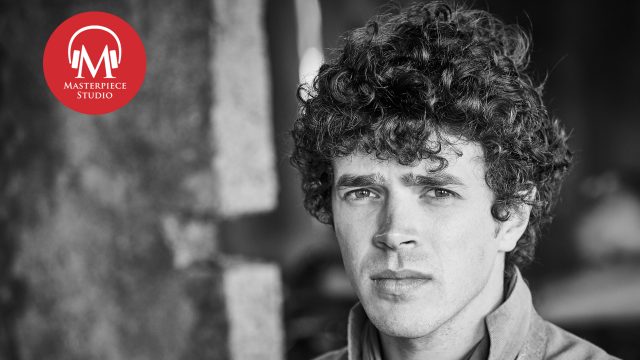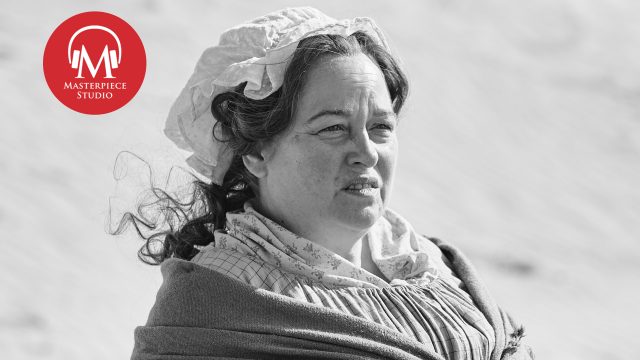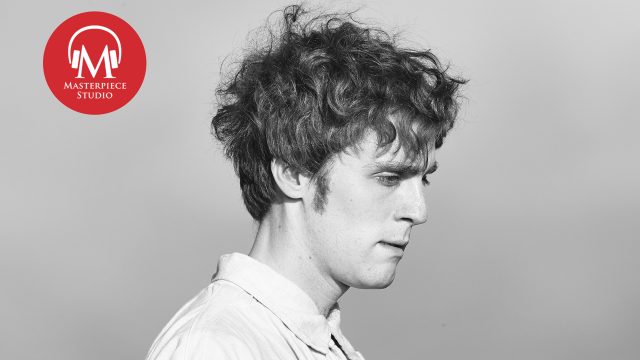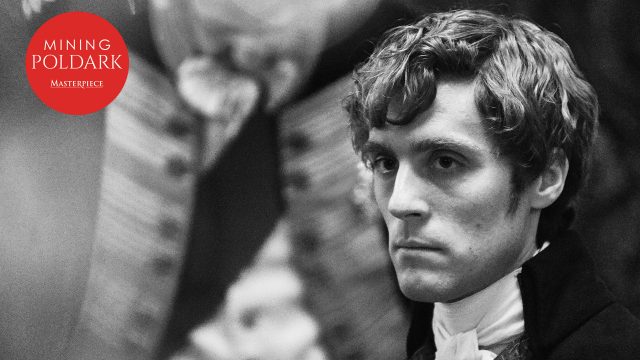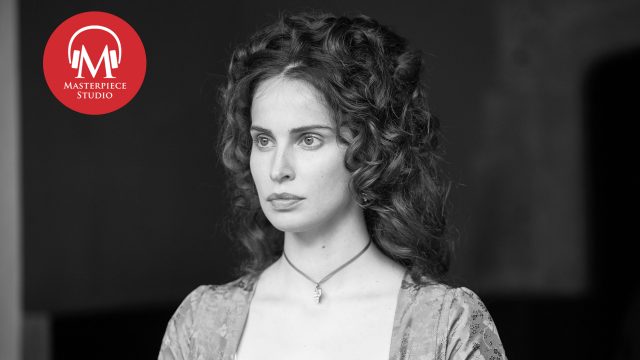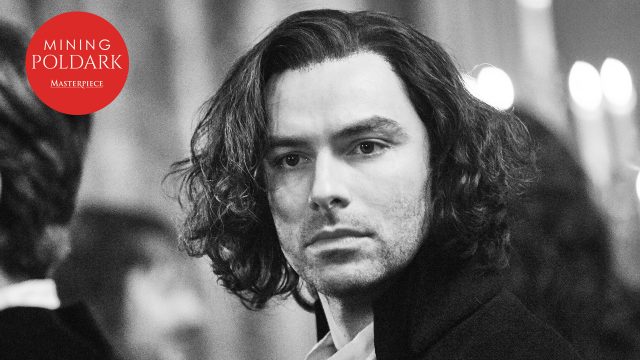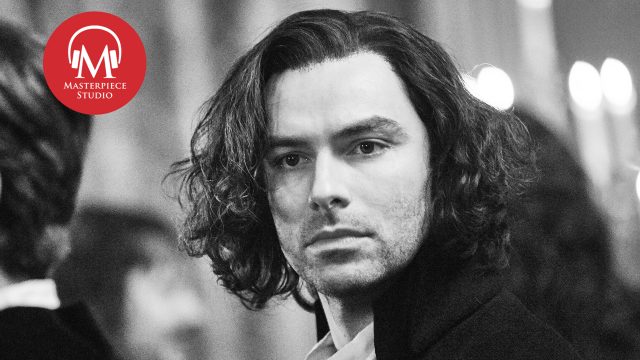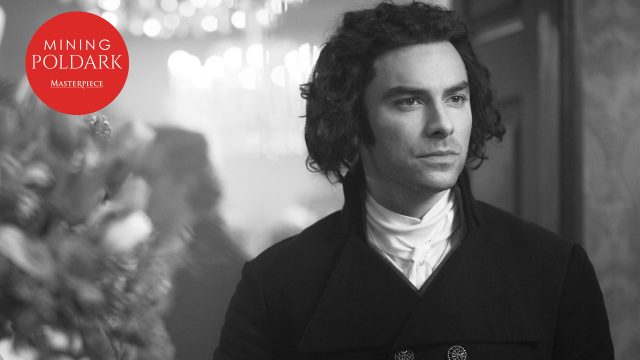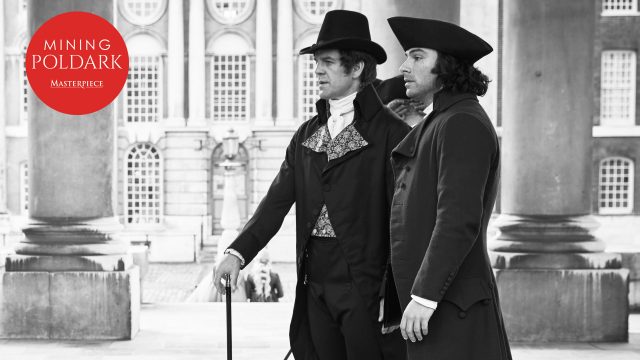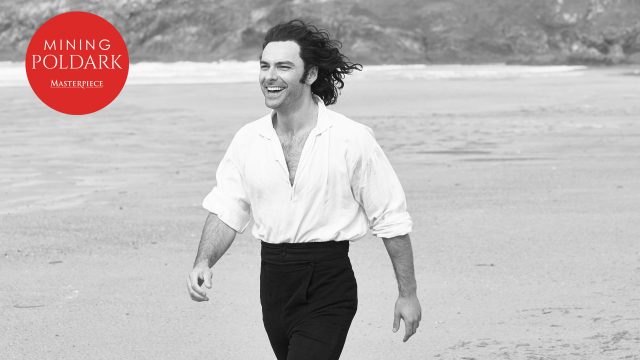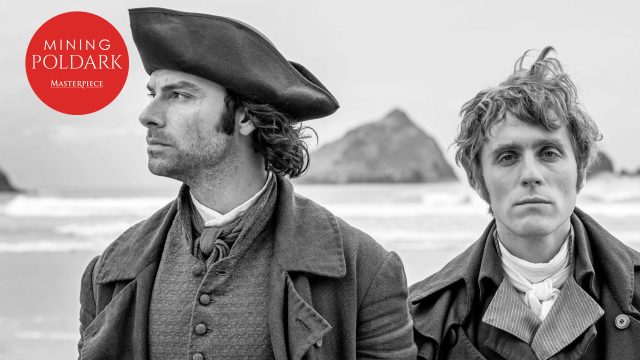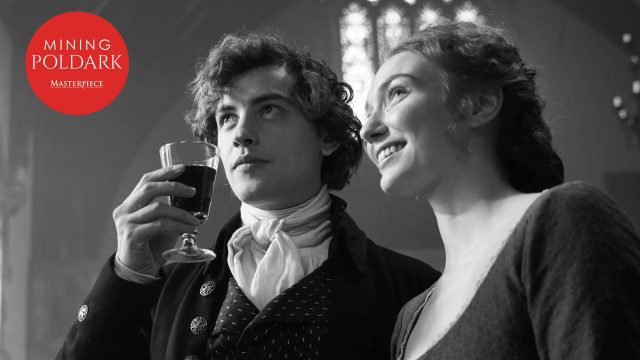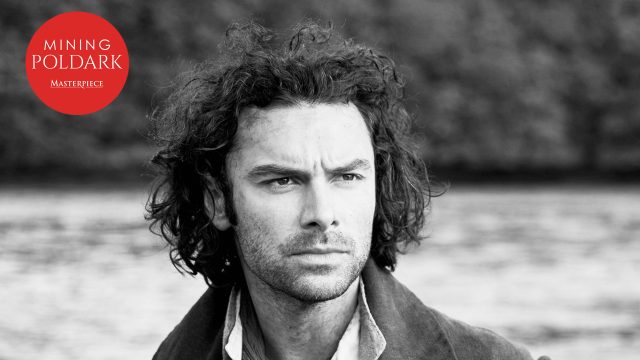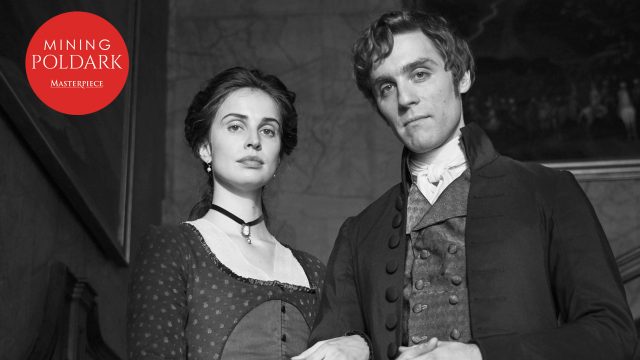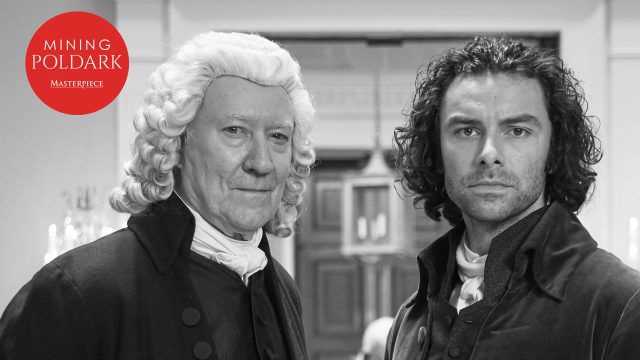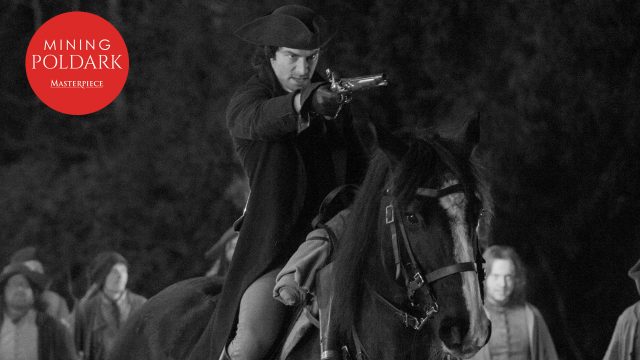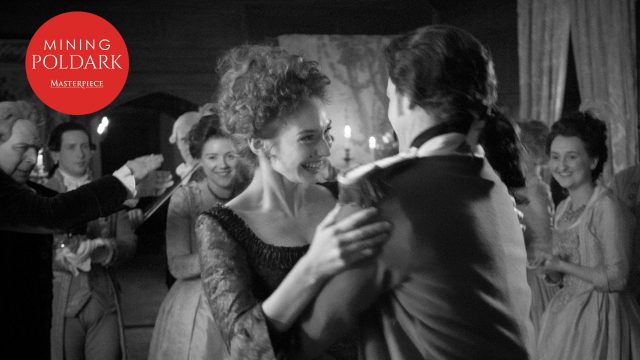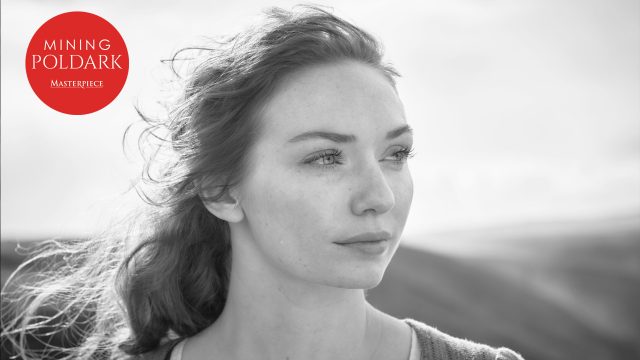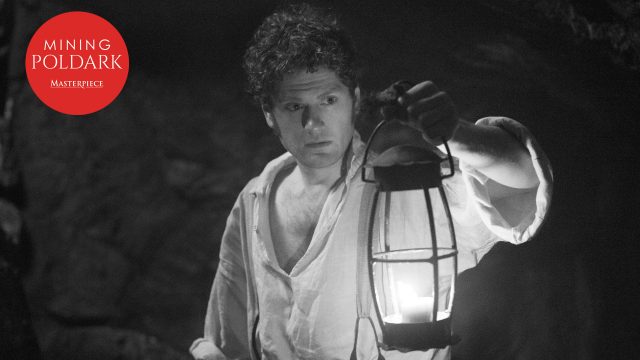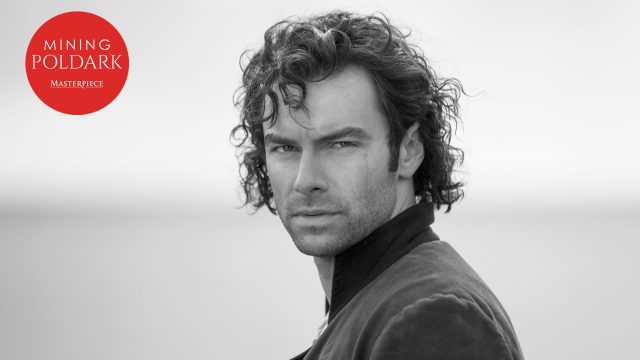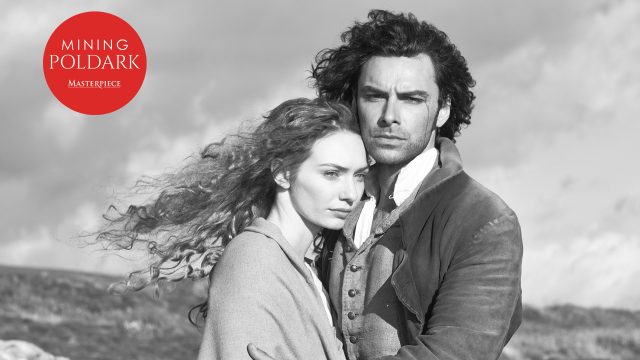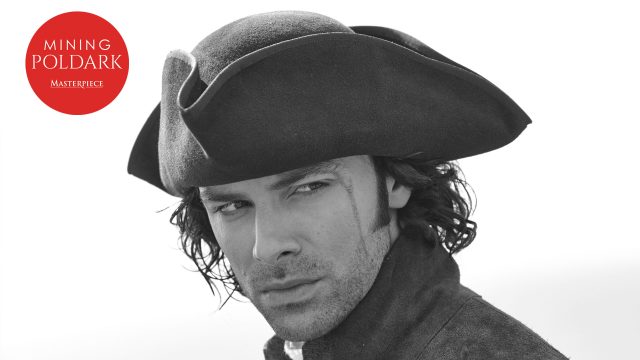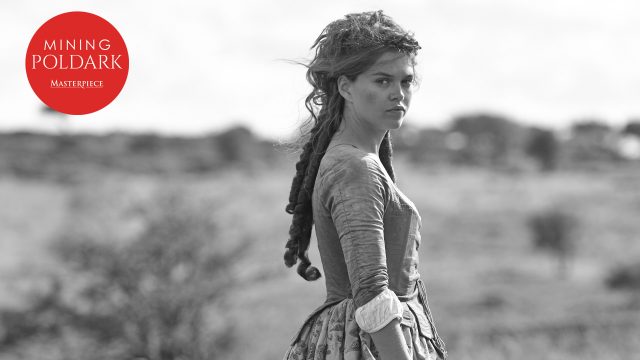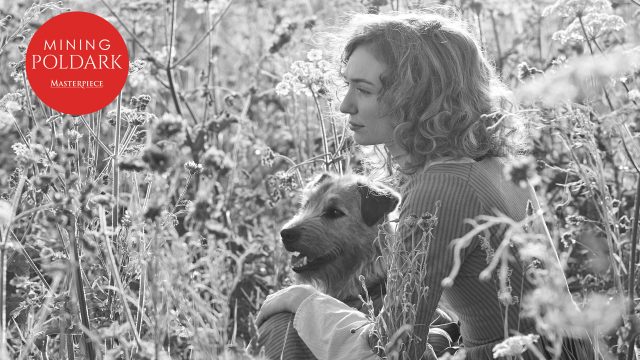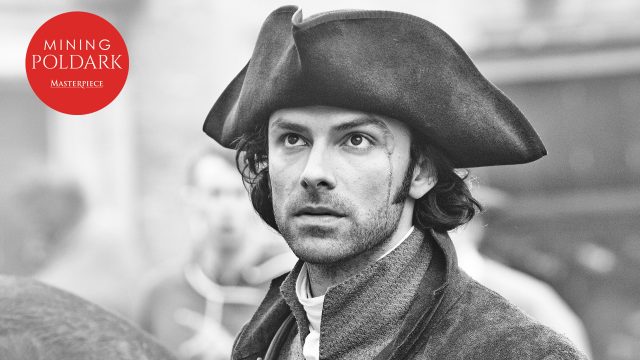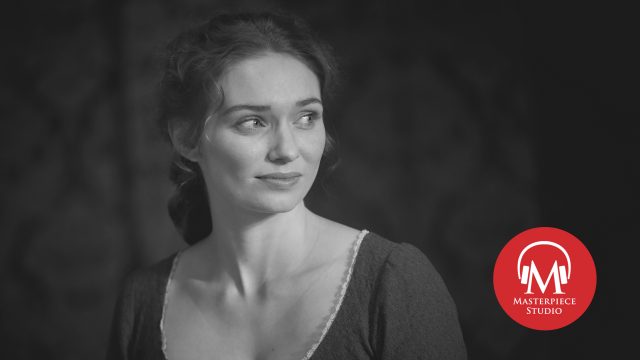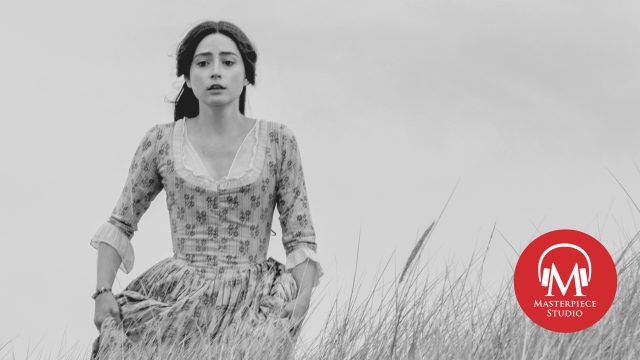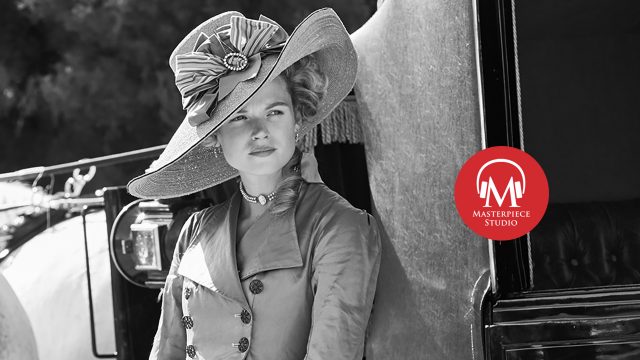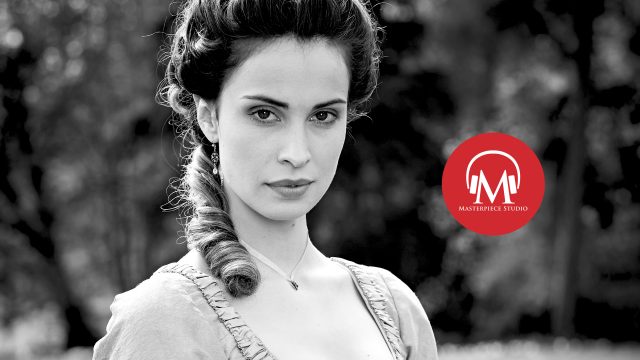With all of George Warleggan’s antics this season and last, it’s hard to see him as anything other than Cornwall’s resident villain…or is it? In this episode, actor Jack Farthing gives us a different take on the Poldark character.
Download and subscribe on: iTunes | Spotify| RadioPublic
Transcript
Jace Lacob (Jace): We’ll be talking about the first two episodes of Poldark Season 2, so if you’re behind in the broadcast, be sure to get all caught up before listening.
MASTERPIECE Studio is brought to you by Audible. For a free trial, go to Audible.com/Masterpiece.
Jace: I’m Jace Lacob and you’re listening to MASTERPIECE Studio.
While the Presidential debate certainly offered up its own brand of drama, it also put Poldark’s second season on a temporary hold.
So we’re here to satisfy your Poldark craving by bringing you our conversation with actor Jack Farthing — George Warleggan himself.
CLIP:
George: Ross. How are you? You don’t look at all well. Can it be the anxieties of the trial?
Ross: Nor you, George. Could you’ve had some disappointment?
Jace: Though some things — like who should be our next president — can be debated, it’s hard to see George Warleggan as anything other than Cornwall’s resident villain… or is it?
CLIP:
Jack Farthing: George is the hero of his story (laughs). In his show, it’s Ross who’s the enemy, and who behaves badly… And so, yeah. He doesn’t feel like “the villain” to me.
Jace: In this episode, Jack Farthing helps us to see a different side of the character we love to hate, George Warleggan.
And we are joined this week by Jack Farthing, welcome.
Jack Farthing (Jack): Hi, thank you. Thanks for having me.
Jace: What did you make of the character of George Warleggan when you first read the scripts for Season 1?
Jack: I mean, he’s pretty appealing. I (laughs) I went for him; I fell for him pretty quick. And he felt real and a, sort of, some way off from who I think I am, in real life (laughs). So, he was a challenge and something I wanted to, sort of, jump at.
Jace: The first time we meet George Warleggan is in the first episode where George congratulates Ross quote “on the scratch,” and he tries to make it seem like these two men are similar.
CLIP:
George: We have something in common. Both fatherless, hostages to our family’s fortune.
Ross: And there the similarity ends.
Jace: Ross is right off the bet so cruel to George. Should we feel bad for George initially?
Jack: Well, I’d love to think that somebody out there does. I don’t know. I mean, I think he sometimes behaves in a way that makes him difficult to feel sorry for. But, I feel sorry for him. I think he has a lot of chips on his shoulder that he can’t quite rid himself of.
Jace: Ross catches Matthew Sanson cheating at cards after ruining Francis and attacks him.
CLIP:
Ross: Can you explain how you’ve come to have a card in your hand before you drew one from the pack?
Sanson: You’re mistaken. I’d already drawn.
George: I’d rather think he had, Ross.
Dwight: Oh no he had not.
Francis: He most certainly had not.
Jace: Do you feel that George knew that Sanson was cheating all along?
Jack: That’s an interesting question. It’s a really interesting question and something I thought about a lot.
I came to the conclusion that he didn’t because there’s lots in the books that, for all George’s underhand dealings, he is very– well, most of the time, he really does value honesty, and he wants to beat Ross and he wants to floor Ross, but he wants to do it honestly, and he wants to really win.
You know, from his perspective, all he knew was that Sanson was very, very good at cars and was likely to take a lot of money off Ross, so wanted that card game to happen, but didn’t necessarily know that Sanson was cheating.
Jace: George visits Elizabeth at the end of Season 1 after the wreck of George’s ship, and says that “He will no longer have his feelings misunderstand or his intentions.” What are his intentions at this point towards Elizabeth Poldark?
Jack: Well, exactly, exactly. (Laughs)
Yeah, it’s a funny one. You know, George, in going to see Elizabeth then, he is behaving very improperly. You know, she’s a married woman, and she’s married to an apparent friend of his and… But he is, you know, he’s, sort of, grieving from the death of his cousin, he has been wronged, and his world has been turned upside down. So specifically, what his intentions are is up for grabs, but he’s telling her that he has feelings for her and he has for a very long time, and he wants her to know that, and he doesn’t want it to unsaid anymore.
CLIP:
Elizabeth: You must not say this to me, George.
George: Oh I must. And I do. I will no longer have my feelings misunderstood, or my intentions.
Jace: Would he have Elizabeth become his mistress?
Jack: That’s difficult, I don’t know. I think… I don’t think he would. I mean, George, you know, has been so consciously brought up. You know, he’s been so taught, and so meticulously schooled and mannered, that I don’t know if that would be what he wants. You know, what he would want is he’d want, he’d want her as his wife, as his second in command, you know, as his trophy, I guess, to an extent. That’s what he wants.
But I’m not… I don’t think really in that scene he’s thought that far ahead. I think he has an emotional response to a crisis in his life, and it leads him to her.
Jace: George and Elizabeth might be more similar than any of the other possible pairings on the show. They both strive to keep their faces so tempered and unemotional — that mask that you mentioned earlier — but they’re both riddled with so much emotion beneath the surface. What do you make of their similarities?
Jack: I think you’re absolutely right. I think they do. I think they do have a lot in common. I think, you know, they both, kind of, have got accustomed to a certain way of life. And you’re right, they both hide a huge amount.
I think that, you know, I think that’s a product of the time as well. And I think, it wasn’t proper or fashionable really to show your emotions, in the way that Ross does, and that’s why people are surprised by Ross sometimes, because he shows his emotions.
But I think they are similar, and I think probably George knows that.
Jace: Even after everything that has happened in Season 1, George maintains that he and Ross have much in common. Why is George so desperate for Ross’s approval at this point?`
Jack: Yeah, big question. I mean, he– That’s sort of his main motivation. You know, he wants… Ross is the one person really in that world that doesn’t give– that isn’t afraid of George.
George is striving for the kind of status and respect that he feels he deserves, having achieved what he has achieved. And, you know, most people see him as an upstart, as new money, as someone not really worthy of a claim.
But even those people who feel like that, they at least pretend. Ross doesn’t pretend. He gives him no respect. He throws things back in his face. So, I think, that quest for Ross to be proved wrong, and to finally say, “Okay, George. You’re right. I need you. You’re more powerful than I am,” you know, that’s the sort of fantasy that (laughs), that motivates him to behave in the way that he does.
Jace: I mean, is it just a class issue or is there something deeper at the root of their rivalry?
Jack: I think it is, you know, there’s definitely– class is definitely involved. But it’s a personality thing, I think. George is hugely jealous of, you know, almost everything that Ross has for free: all of that name, all of that claim, all of that popularity, you know. George has none of that, and wants it and recognizes its value and… So I think it is some class. But you know, they have a physical reaction to each other that is bound up in the way that their personalities are made up.
Jace: Does he hate Ross enough to actually want him to swing at the gallows?
Jack: Well, yeah, I mean that’s another conundrum. I mean, on the one hand he does, on the other he doesn’t.
What’s interesting about George, I think, is that he will ruthlessly pursue an idea, despite his doubts about it. I think, there are moments during the trial when we see a degree of uncertainty. There’s something that makes him careful. And yeah, partly that’s probably bound up in the knowledge that Ross is a good man, and that possibly there remains potential for them to kind of work in partnership.
CLIP:
George: How do you inspire such loyalty? It impresses me. I see its value. I could use it.
Jace: How has he been changed by the death of Matthew Samson? Is he the same man we saw at the outset of the series?
Jack: I think so, I think it’s hardened him. I think when we see him at the beginning of Series 2 he has grown a little, even though we come pretty much straight in. He just has a bit more power and swagger, I think, which, you know, inevitably leads to more kind of confrontation.
Jace: George’s relationship with Francis fractures when Francis finally stands up to George in the scene at the inn. What was it like shooting that scene?
Jack: The one where he comes out to me at the table and shows me the leaflet, you mean?
Jace: He says, “You own me…”
CLIP:
Francis: And my indebtedness to you has long muddied the waters between us, so I trust that any confusion about my feelings is now entirely cleared up.
Jack: No it’s a lovely scene. I mean, I love doing scenes with Kyle, I think he’s a beautiful actor. It’s also nice because Kyle and I, in Series 1, obviously had a lot of scenes together that were friendly and that were sort of about comradeship and togetherness. And so now, we’re at the other end of the spectrum, and he is sort of spitting venom at me.
CLIP:
Francis: You may even buy your way into every club, mine, and drawing room in the county, but what you will never buy is nobility, or breeding, or even common decency.
Jack: There’s a lot that Winston Graham writes about George that he swallows insults and will pay them back later (laughs), which I love as an idea. He is very good at taking things and not immediately flying off the handle and reacting. I mean, when it’s Ross, he sometimes flies off the handle and overreacts.
But most of the time, he’s quite good at just listening, just hearing, just sponging it up, and then working out how he’s going to pay that person back for what they’ve said. And that’s kind of what’s happening there. So that scene was nice, for me, because I’m just listening really, and you know, remaining sort of silently threatening.
Jace: Jud Paynter recounts his statement against Ross Poldark and George wants a reprisal against him, which leads to the attack on Jud by Tom Harry and Tankard.
CLIP:
Tom: That is not what we have come for.
Jud: For what then?
Tom: This. [Hits Jud]
Jace: Does George really want Jud Paynter to murdered?
Jack: No, I don’t think so. I don’t think so at all. I think, he wanted him to be roughed up and taught a lesson. And I think, you know, George’s discovery that he has been killed is a real blow.
I think, he thinks, “Well, I mean, if anything’s going to make Ross overreact and come for me, it’s going to be the death of his manservant like that.”
Jace: Would George consider Tankard to be a lackey or a friend?
Jack: That’s interesting. I think probably he’d consider him a lackey (laughs). But there’s really… What I love is, you know, you see different sides of George depending on who he’s talking to. But with Tankard, he’s allowed to be at his most, kind of, devious, and scheming, and business-y.
You know, even with his uncle Cary, there’s a certain degree to which him and Cary don’t see eye to eye, and they fight, and Cary winds him up, and so that’s one relationship. But when he’s with Tankard, he is, you know, he’s absolutely in business mode, and that was fun.
Jace: You anticipated my next question which was, “How do you see George’s relationship with his uncle Cary, and what does Cary represent to George?”
Jack: It’s a very interesting relationship. I think it is old school/new school, you know, evident even just in the way that we speak. I think, you know, George has made an attempt to really vanish over his upbringing. Cary doesn’t mind so much, and as long as he’s making money, and is, you know, causing damage in the business world (laughs), then he’s fine with it.
CLIP:
Cary: These Poldarks have nothing beyond the name. Mine on its knees and mortgaged to the hilt, Warleggans Bank my send in the bailiffs as and when it chooses.
George: This is elegant talk for a wedding, Uncle.
Cary: Talk of a profit is always elegant, George.
Jack: I think definitely George has a fair amount of Cary in him. But I think also George has something else, which is, you know, something like, he’s got more conscience; he’s got more that he’s fighting up against. Cary has no qualms about behaving abominably. George sometimes does, which is interesting for me, you know, where the line is for George, and I think it moves a lot. But for Cary it’s definitely, you know, the line is (laughs) irrelevant. There is no line.
Jace: Do you see George as a villain?
Jack: I mean, I don’t think it’s helpful for me, as an actor, to see George as a villain. I can obviously see that he behaves villainously on occasion, but I think probably we all do.
I think the nice thing about George, which I’ve always said, is that there’s always justification for his behavior. He doesn’t do it just because he’s bad. He does it for all sorts of complicated reasons that I can always find a psychological, kind of, seed for.
Jace: God, that was a George Warleggan answer.
Jack: I know, wasn’t it? Sorry, I think I’m (laughs) writing my own script (laughs).
Jace: I mean, I do think you do keep him very human and relatable, rather than, you know, a traditional, sort of, mustache-twirling villain. We do feel sympathy for George, even when he is — no offence to George Warleggan — an awful, awful person…
Jack: (Laughs) None taken.
Jace: You know, is that a challenge to walk, as you say, that fine line?
Jack: Yes, I think it is. Yeah, it is challenge. It’s a great challenge. I, you know, I hope I achieve what I want to achieve with it. I don’t know, obviously. Everyone who watches it sees something different, and that’s kind of the beauty of it.
But yeah, I’ve always been keen to suggest that there are reasons for the way that he behaves, and to suggest that it’s as much about his vulnerability and insecurity that it is about him being a, sort of, psychopath. Because I’m not sure that’s that helpful really, and I’m not sure it’s that interesting. I think it’s more interesting to feel like, you know, you’re watching someone with the potential to behave well. I want George to be to an extent unpredictable.
Jace: But I think that that unpredictability is exactly what makes George so dangerous.
Jack: Yeah, I think so too, because, exactly, for all the times that he could potentially show a bit of heart or a bit of conscience, there are the other times when he can show much more venom than you might expect.
Jace: What do you think is George’s fatal flaw? What’s his Achilles’ heel?
Jack: What is his fatal flaw? Well, his background, you know, that’s the thing that he fights; it’s his rejection of his grandfather, and that’s his biggest weakness.
And it’s Ross. You know, it’s Ross more than anyone else in that region who has the ability to make him feel insecure about that, but it’s that that really drives him.
Jace: He’ll always be the up-jumped grandson of a blacksmith.
Jack: However hard he fights, he always will be. But he covers it in more and more clothes and polish, you know, and so…
Jace: Well, I was going to ask if, if clothes maketh the man, how important are George’s clothes to his sense of status and class?
Jack: Very, I think. Yeah, I think, you know, he’s a man for whom image is almost everything. Uh…
Jace: He’s the best dressed character on the show.
Jack: That’s very kind. That’s not down to me in any way. It’s down to our wonderful wardrobe department (laughs). But I agree, I think he’s got some beautiful, beautiful clothes and…
But it’s lovely for me as an actor, you know, it’s a real way in. It’s a real… It’s just nothing gives you that feeling quicker than buttoning up a beautiful tailored tail-coat. You know, it’s extraordinary some of the stuff that he wears.
He’s an actor really, you know, that’s, that’s what I like, is he’s a performer and he’s constantly performing the part of the perfect young aristocrat, and hoping no one will see the cracks (laughs).
Jace: I love George’s scenes with Aunt Agatha, who truly loathes him and isn’t afraid to show it.
CLIP:
Aunt Agatha: That upstart is here again.
Jace: What is it like shooting these scenes with Caroline Blakiston?
Jack: Oh, so good. I love them. I love her.
You know, it’s interesting, their relationship, because, you know, from the outset, you’d see this old lady sitting in the corner by the fire, you know, sort of playing cards or eating porridge, and you think, “She’s as harmless as they could possibly get.” But for some reason George is threatened by her and riled, and she knows she has the power to do that, and he knows that he is antagonized by her. So they have this, sort of, strange feud which actually develops and develops, but I love doing those scenes, absolutely love them.
Jace: George humiliates Demelza in front of the Judge by unmasking her as Ross’s wife and then makes an example of Ross.
CLIP:
George: You must be grateful for the distraction, ma’am. Were you speaking of your husband? Of course you will meet him tomorrow.
Judge Lister Wentworth: Sir?
George: Ross Poldark, when he comes before you in court.
Jace: Why does he look down on Demelza so severely?
Jack: That’s interesting. You know, I think, it was interesting for me thinking about George’s reaction to them.
You know, when they first got married… You know, on the one hand, it’s a complete gift for George, the fact that Ross has decided to marry this scullery maid, you know, which is just the most extraordinary move for a man of his station, in George’s view. But I think George comes to realize that Demelza, you know, there’s much more to her than meets the eye, and I think she is a threat.
So I think, when there’s the opportunity to really rub her face in the mud, he will jump at it and know that in some way he’s also, you know, stabbing at Ross by doing so.
Jace: There’s a great scene in that first episode where George visits Ross in prison and offers the “hand of friendship.”
CLIP:
George: What do you say Ross? Will you meet me halfway?
Jace: And when Ross refuses, George has a fantastically cutting response.
CLIP:
George: But when you go to the gallows, I’ll be able to say, hand on heart, to Elizabeth, “I offered Ross Poldark my help, and he turned me down.” So thank you for being every bit as predictable as I hoped you’d be.
Jace: Was he being genuine when he offered to help or is this just, sort of, George gloating?
Jack: Yes see again, this went back and forth, and we talked a lot about it, myself, and the director, and Debbie.
I think he protects himself by allowing both eventualities to be possible. I think, you know, he can’t be deluding himself to the extent that he… You know, he knows that it’s much more likely that Ross is not going to be able to accept this offer, which is why he is armed with, “I knew you were going to say that. You’ve played right into my hands. Perfect.”
But, I wanted there just to be the glint, the suggestion that if Ross had reached out and shook his hand, however surprised George would be, he’d also accept it and say, “Right, okay. Let’s go from here.”
But I think, as I said, he’s fully armed with ammunition to, sort of, slap him down when he says, “No.”
Jace: At the end of the episode, he’s quite literally armed. Ross is acquitted, and George places the gun in the drawer. Does he anticipate that there will be consequences to his campaign against Ross?
Jack: Yeah, I think he sort of realizes that. I think, you know, Tankard reminds him that Ross is a soldier and that George absolutely isn’t a soldier, and it leads into George beginning to, you know, sort of train, as it were, and make himself, how he feels, a credible opponent.
But it’s all part of it for me; it’s all part of George becoming a slightly different person to the one that he was in Series 1 where he had uncertainty, he had doubts.
But you know, at the end of day, keeping a pistol in your drawer is hardly a sign of confidence. So, he still got that — I mean, I’m not going to say cowardly, because he’s my hero, but there’s something like that in there.
Jace: (Laughs)
He does, he does begin his path to Rocky-dom. He begins sparring lessons in this week’s episode, and we get to see some 18th century boxing technique at work.
Jack: (Laughs) I know. Do we? I don’t know if we do (laughs). We see something like that…
Jace: (Laughs) What was it like training?
Jack: You know, it’s a funny thing, that, sort of, bare-knuckle boxing. It’s very, you know, it’s very different to the boxing that we know now. It was before they had any– they worked out about guards with your fist, so it was all long arm and you kept your distance, and you just sort of pop in for a jab, and then get out of the way as quickly as you could.
So, it does look quite funny, to me anyway. But it was great. It’s great. You know, I love those specific, historical skills. One of the best things about my job is, you know, those weird little areas of research that you’re allowed into, and you’re given time to really investigate.
And it’s also, as I said, it’s fun. You know, it’s a new side of George. Who would expect, really, to see him doing that? So it’s quite fun to surprise people, and see how we can stretch the idea of George.
Jace: Was there any other niche thing that you learned about 18th century Cornwall just from being on the show? Were you an expert in mining prior?
Jack: I mean, yeah. I went… But I know absolutely everything there is to know (laughs).
I’ll tell you one thing, Kyle and I, because we played a lot of cards in the first series, we got taught this 18th century card game called Piquet, which we then, sort of, became obsessed with and played when we weren’t anyway near Poldark (laughs) pathetically.
But it’s a great game. Sort of the slowest and most complicated card game I’ve ever played in my life, but it’s an 18th century original and it was… That was definitely something.
Jace: Looking back on the show so far, do you have a favorite scene?
Jack: Wow. I mean I have to say one of my favorite scenes was the one that you mentioned where I sit down with Ross in the prison, because, you know, there are so many scenes in the show where there are lots of other complications — be they horses or dancing, or you know, great crowds. And this was so contained and so, kind of, long awaited, you know.
I love that, sort of, scene where it’s just you and the conversation partner, and there’s so much between them, and so much has gone that just them sitting opposite each other across the table has such weight to it. So I have to say that was a real pleasure for me.
Jace: How does it feel to play the character that people love to hate?
Jack: I mean it’s lovely, it’s lovely. It’s, you know, if people love to do anything with George is my privilege.
He is… He represents something quite specific. He is, you know, the show’s biggest antagonist in a way. And yeah, you know, I haven’t received any horrible hate mail or (laughs). It’s just been nice. People have been really nice about it.
Jace: Oh, the hate mail’s coming, because I’ve seen what’s coming up.
Jack: Yeah, maybe it is (laughs).
Jace: It’s coming, it’s coming (laughs).
Can you tease what’s coming up for George and his Poldark rivals?
Jack: Well, I mean, there’s so much to come, so much ahead in the series. I mean, you know, as I’ve said, he’s definitely — without giving anything away — he’s definitely stepping forward. He’s definitely allowing himself to be in Ross’s face much more. So, yeah. I think he’s just, he’s expanding as a person. It’s like spending more time with someone, you know, you just get to know them more.
Jace: Poldark returns next week, October 17th with a brand new episode.
Then, MASTERPIECE Studio will be back in two weeks — on October 24th — to take you behind-the-scenes of Season 2, this time with the unexpectedly American actor Kyle Soller.
CLIP:
Kyle Soller: I’ve had a lot of people come up to me in the street and I’ll have a conversation with them and it’ll take them about halfway through the conversation for them to just blurt out, “Oh my god, you’re American?”
Jace: Check out our other conversations with the Poldark cast — including Aidan Turner and Eleanor Tomlinson — by finding us — MASTERPIECE Studio — at pbs.org/masterpiece or on iTunes and Stitcher.
If you do find yourself on our iTunes or Stitcher page, please also take a few seconds to rate the show or leave us a review. We’d love to know what you think of the podcast.
MASTERPIECE Studio is hosted by me, Jace Lacob and produced by Rachel Aronoff. Kathy Tu is our editor. Special thanks to Barrett Brountas and Nathan Tobey. The executive producer of MASTERPIECE is Rebecca Eaton.
MASTERPIECE Studio is brought to you by Audible.
Sponsors for MASTERPIECE on PBS are Viking River Cruises, Audible, and The MASTERPIECE Trust.
Poldark Podcasts 68 More Podcasts
MASTERPIECE Newsletter
Sign up to get the latest news on your favorite dramas and mysteries, as well as exclusive content, video, sweepstakes and more.












